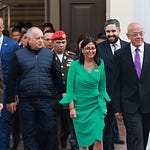Last month, Tulsi Gabbard in her capacity as the head of DNI released a number of documents pertaining to Russiagate. On the right, an entire mythology has grown around the idea that the Obama administration, Hillary, and Deep State actors fabricated the idea that Russia helped get Trump elected, along with the narrative surrounding ties between his campaign and the Putin regime.
Even as someone who hasn’t followed all the twists and turns of this saga, I knew enough to understand that some of Gabbard’s most sensationalist claims were laughable. With great fanfare, she informed the world that the Obama administration knew that Russia had never hacked the voting machines to deliver a Trump victory. Under the headline “New Evidence of Obama Administration Conspiracy to Subvert President Trump’s 2016 Victory and Presidency,” the DNI press release lists the following bullet points
In the months leading up to the November 2016 election, the Intelligence Community (IC) consistently assessed that Russia is “probably not trying … to influence the election by using cyber means.”
On December 7, 2016, after the election, talking points were prepared for DNI James Clapper stating, “Foreign adversaries did not use cyberattacks on election infrastructure to alter the US Presidential election outcome.”
On December 9, 2016, President Obama’s White House gathered top National Security Council Principals for a meeting that included James Clapper, John Brennan, Susan Rice, John Kerry, Loretta Lynch, Andrew McCabe and others, to discuss Russia.
After the meeting, DNI Clapper’s Executive Assistant sent an email to IC leaders tasking them with creating a new IC assessment “per the President’s request” that details the “tools Moscow used and actions it took to influence the 2016 election.” It went on to say, “ODNI will lead this effort with participation from CIA, FBI, NSA, and DHS.”
Obama officials leaked false statements to media outlets, including The Washington Post, claiming, “Russia has attempted through cyber means to interfere in, if not actively influence, the outcome of an election.”
On January 6, 2017, a new Intelligence Community Assessment was released that directly contradicted the IC assessments that were made throughout the previous six months.
The problem of course is that the administration never claimed that Russia manipulated the vote tally! Everyone who is familiar with the most basic facts surrounding Russiagate knew this already.
Go back to the first bullet point, with the quote that Russia was “probably not trying … to influence the election by using cyber means.” Now look at the complete passage here, on page 2, taken first from the email of an unnamed Obama administration official:
Russia probably is not trying to going to be able to? (sic) influence the election by using cyber means to manipulate computer-enabled election infrastructure. Russia probably is using cyber means primarily to influence the election by stealing campaign party data and leaking select items, and it is also using public propaganda. [emphasis added]
Another email in response concurs with this judgment and repeats the phrase.
The dishonesty is staggering. Put aside all other claims that Gabbard makes, this is so blatantly in bad faith that it’s immediately discrediting, and should make you skeptical of everything else these people say. Especially when this lie is combined with calls for Obama to be prosecuted. The Trump administration is speaking to an audience that it knows is misinformed, or unable to understand the distinction between “Russia tried to influence the election” and “Russia tried to change the election outcome by manipulating voting machines.”
This recent news renewed my interest in the Russiagate story, so I invited my friend Renée DiResta (X, Substack, personal website) on a livestream to talk about it. She is a professor at the McCourt School of Public Policy at Georgetown University, and the former research manager at the Stanford Internet Observatory. She also did work on the Senate Select Committee on Intelligence investigating Russian interference in the 2016 election.
I used to take a very dim view of the misinformation crowd, and there are many researchers out there who give the field a bad name. I once saw institutions like the Stanford Internet Observatory as being at the center of a vast censorship complex that sought to simply stamp out all dissent from leftist orthodoxy. As someone who was repeatedly suspended under the old Twitter regime, I joined many on the right in seeing these people as a personal threat to my right to speak.
If only the world could have stayed so simple! I could be a free speech absolutist, and never take any position that risks giving power to people who might eventually censor me. Yet recent years have shown that we need something like a community of responsible academics, intellectuals, and curators of content watching over the misinformed mobs that have been mobilized in the era of social media.
If the flaws of the misinformation studies community made many of us believe in the desirability of an internet without any public or private regulation at all, the Trump movement and Elon’s X have made the best case against that position one can imagine. The flaws of the media and liberal establishment can be dealt with through appeals to morality, compelling counterarguments, and attempts to hold people to their own stated principles. In contrast, there is no way to take a similar approach to MAGA. These people simply lack any interest in building or maintaining truth-seeking institutions, and are appealing to a political base that is so misinformed that it allows them to get away with what more sophisticated observers will recognize as absurd lies.
All of this is to say we need people like Renée. She walks me through the latest Russiagate news, and dissects Gabbard’s claims one-by-one. We start with the aforementioned non sequitur about the Obama administration knowing that Russia did not hack voting machines. We then go on to discuss whether Russia preferred Trump in 2016, the Durham annex, and more.
One important point that needs to be emphasized is that the Senate Select Committee Report, with Marco Rubio serving as chair, concluded that the Russians tried to help Trump in 2016.
This hasn’t been controversial until recently. The two House Permanent Select Committee on Intelligence reports quibbled with that conclusion. Note that the HPSCI was chaired by Devin Nunes at the time, whose job is now literally being the head of Truth Social, and working as an aide was Kash Patel, whose job is now literally being the head of the FBI after a time writing children’s books teaching kids to worship Trump, and of course getting consulting fees from Truth Social. Arguments should be judged on their merits, but it tells you something when the mainstream of both parties agree on something, while the only ones who take the opposite position are known grifters and Trump lackeys. And even the HPSCI reports don’t put forward the most radical claims spread by MAGA influencers and Michael Shellenberger types, like the idea that Putin actually preferred Hillary, or that the DNC hack wasn’t carried out by the Russians.
We close by discussing why this matters, what is at stake when we continue to debate Russiagate, AI slop, and what can be done to make social media better.
Important documents
January 2017 Intelligence Community Assessment
Senate Select Committee on Intelligence Report (August 2020)
The House Permanent Select Committee on Intelligence Report (filed September 2020, released July 2025) (not to be confused with the HPSCI report from 2018)
The Durham Report and the annex (May 2023)
Articles
Renée, “Reconning ‘Russiagate’”; her conversation with Shellenberger
NYT 2015 report on Russian internet troll farm












